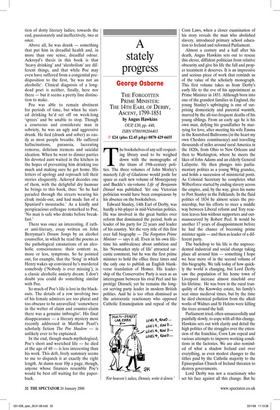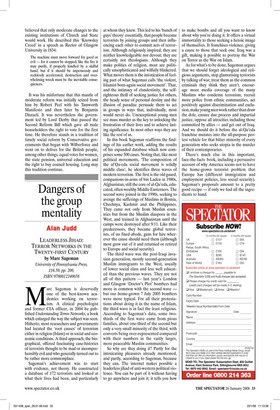A stately progress
George Osborne
THE FORGOTTEN PRIME MINISTER: THE 14TH EARL OF DERBY, ASCENT, 1799-1851 by Angus Hawkins OUP, £30, pp. 448, ISBN 9780199204403 ✆ £24 (plus £2.45 p&p) 0870 429 6655 The bookshelves of any self-respecting library used to be weighed down with the monographs of the titans of 19th-century politics. The three volumes of John Morley’s masterly Life of Gladstone would jostle for space as each new volume of Moneypenny and Buckle’s six-volume Life of Benjamin Disrael was published. Yet one Victorian politician would have been conspicuous by his absence on the bookshelves.
Edward Stanley, 14th Earl of Derby, was hardly a bit-player in mid-Victorian politics. He was involved in the great battles over reform that dominated the period, both as leader of his party for 22 years and leader of his country. Yet the very title of this first ever full biography — The Forgotten Prime Minister — says it all. Even in his own lifetime his ambivalence about ambition and his ‘Newmarket style of life’ attracted sarcastic comment, but he was the first prime minister to hold the office three times and the only one to publish an English blankverse translation of Homer. His leadership of the Conservative Party is seen as an interregnum between his rival Peel and his protégé Disraeli, yet he remains the longest serving party leader in modern British politics. And he is too often dismissed as the aristocratic reactionary who opposed Catholic Emancipation and repeal of the Corn Laws, when a closer examination of his story reveals the man who abolished slavery, introduced primary school education to Ireland and reformed Parliament.
Almost a century and a half after his death, Angus Hawkins sets out to rescue this clever, diffident politician from relative obscurity and give his life the full and proper treatment it deserves. It is an impressive and serious piece of work that reminds us of the value of the scholarly monograph. This first volume takes us from Derby’s early life to the eve of his appointment as Prime Minister in 1851. Although born into one of the grandest families in England, the young Stanley’s upbringing is one of surprising domesticity and parental warmth, marred by the all-too-frequent deaths of his young siblings. From an early age he is his own man, defying his grandfather by marrying for love, after meeting his wife Emma in the Knutsford Ballrooms (in the heart my own Cheshire constituency) and travelling thousands of miles around rural America in the 1820s, from Ohio to New Orleans and then to Washington, where he meets the likes of John Adams and an elderly General Lafayette. He then plunges into parliamentary politics as a young Whig grandee, and holds a succession of ministerial posts. As Colonial Secretary he completes what Wilberforce started by ending slavery across the empire, and, by the way, gives his name to Port Stanley in the Falklands. In the fluid politics of 1834 he almost seizes the premiership, but his efforts to steer a middle way between Liberal reform and Tory reaction leaves him without supporters and outmanoeuvred by Robert Peel. It would be another 17 years of disappointment before he had the chance of becoming prime minister again — and then as leader of a different party.
The backdrop to his life is the unprecedented industrial and social change taking place all around him — something I hope we hear more of in the second volume of this biography. We talk today of how quickly the world is changing, but Lord Derby saw the population of his home town of Liverpool increase almost ninefold over his lifetime. He was born in the rural tranquility of the Knowsley estate, his family’s seat since medieval times, but by the time he died chemical pollution from the alkali works of Widnes and St Helens were killing the trees around the hall.
Parliament tried, often unsuccessfully and painfully slowly, to cope with all this change. Hawkins sets out with clarity and detail the high politics of the struggles over the extension of the franchise, Corn Law repeal and various attempts to improve working conditions in the factories. We are also reminded of what a shadow Ireland cast over everything, as even modest changes to the tithes paid by the Catholic majority to the Episcopalian Church of Ireland threaten to destroy governments.
Lord Derby was not a reactionary who set his face against all this change. But he believed that only moderate changes to the existing institutions of Church and State would work. He described this ‘Knowsley Creed’ in a speech as Rector of Glasgow University in 1834:
The machine must move forward for good or evil — for it cannot be stopped; like the fire it may purify, if properly kindled by a skilful hand, but if it should be impetuously and recklessly accelerated, destruction and overwhelming wreck must be the inevitable consequences.
It was his misfortune that this mantle of moderate reform was initially seized from him by Robert Peel with his Tamworth Manifesto and then later by Benjamin Disraeli. It was nevertheless the government led by Lord Derby that passed the Second Reform Bill which gave all male householders the right to vote for the first time. He therefore stands in a tradition of timely social reform by Conservative governments that began with Wilberforce and went on to deliver for the British people, among other things, equal votes for women, the state pension, universal education and the right to buy council housing. Long may this tradition continue.











































































 Previous page
Previous page